Best Natural Supplement Stack for Sleep
💤 Introduction: Why Sleep Deserves to Be Your Top Priority
Good sleep is not a luxury—it’s a biological necessity. Yet, in the modern world of screens, stress, caffeine, and late-night work, restorative sleep has become harder than ever to achieve.
Even if you spend 7–8 hours in bed, you may still wake up tired, achy, or anxious. Why? Because the depth and quality of your sleep—not just duration—determine how well your brain and body recover.
That’s where a natural supplement stack can make a major difference. 🌿
Unlike pharmaceutical sleep aids, which can cause dependency or grogginess, natural compounds support your body’s own sleep systems—balancing neurotransmitters, lowering cortisol, and promoting calm.
In this guide, we’ll explore how to build the ultimate natural sleep stack, the science behind each ingredient, and how to personalize it to your lifestyle and stress levels.
🧠 Part 1: Understanding What Really Affects Sleep

Before reaching for supplements, it’s important to understand why your sleep might be off in the first place.
1️⃣ Elevated Cortisol and Adrenal Overload
Cortisol, your main stress hormone, should peak in the morning and drop at night.
But when stress, caffeine, or blue light overstimulate your nervous system, cortisol stays high—and melatonin never gets the signal to rise.
2️⃣ Deficient Neurotransmitters
Key calming neurotransmitters like GABA and serotonin help slow brain activity and prepare for rest.
Low levels can cause racing thoughts, anxiety, and poor sleep continuity.
3️⃣ Mineral Depletion
Magnesium, zinc, and calcium all play roles in muscle relaxation, nerve conduction, and melatonin synthesis.
Even mild deficiencies can trigger restlessness, cramps, or insomnia.
4️⃣ Circadian Rhythm Disruption
Late-night screens, irregular eating, and lack of morning sunlight can confuse your biological clock.
5️⃣ Poor Sleep Architecture
Even if you fall asleep, fragmented sleep prevents entry into deep (slow-wave) and REM stages—where growth hormone and memory consolidation happen.
Your supplement stack should target all five: calm your nervous system, balance neurotransmitters, restore minerals, and align your circadian rhythm.
🌿 Part 2: The Core Sleep Stack (Science-Backed Essentials)
Let’s start with the foundation supplements—the ones that address multiple sleep pathways and work for most people.
🧂 1️⃣ Magnesium Glycinate – The Relaxation Mineral
Why it matters:
Magnesium activates GABA receptors, regulates melatonin, and relaxes muscles.
Without enough magnesium, your body struggles to “switch off.”
Forms:
💤 Glycinate → Best for relaxation and sleep (non-laxative)
⚡ Threonate → Crosses blood-brain barrier for mental calm
💪 Malate → Good for athletes or those with muscle soreness
Dosage: 200–400 mg elemental magnesium, 30–60 min before bed.
Bonus: Combine with L-Theanine or Glycine for deeper calm.
🍵 2️⃣ L-Theanine – The Calm-Focus Amino Acid
Found in green tea, L-Theanine helps your brain produce alpha waves—the same waves generated during meditation.
Benefits:
Reduces stress and racing thoughts 🧘
Increases GABA, serotonin, and dopamine
Improves sleep quality without sedation
Dosage: 200–400 mg before bed.
Stack synergy: Works beautifully with magnesium or GABA supplements.
🧘 3️⃣ Glycine – The Body-Cooler
Glycine is an amino acid that helps lower core body temperature—one of the key triggers for sleep onset.
Benefits:
Shortens time to fall asleep
Improves sleep efficiency
Reduces next-day fatigue
Dosage: 2–3 g 30–60 min before bed (powder or capsule).
Bonus: Pair with magnesium or collagen for joint and muscle recovery.
☀️ 4️⃣ Vitamin D + K2 (Morning Use)
Not technically a “sleep supplement,” but vitamin D deficiency disrupts melatonin and increases risk of insomnia.
Take it in the morning, ideally with food and sunlight exposure.
Dosage:
Vitamin D3: 2000–4000 IU
Vitamin K2 (MK-7): 90–120 mcg to ensure calcium balance.
🌾 5️⃣ Melatonin (Use Carefully)
Melatonin is your sleep-timing hormone. It doesn’t make you sleep—it tells your body it’s time.
When to use:
Jet lag ✈️
Shift work 🕐
Occasional reset after all-nighters
Dosage: Start LOW—0.3 mg to 1 mg, 30 min before bed.
Higher doses can backfire by desensitizing receptors or causing vivid dreams.
🌸 Part 3: Adaptogens and Botanicals for Deep Relaxation
Adaptogenic herbs help your body adapt to stress and support cortisol balance.
🌿 1️⃣ Ashwagandha (Withania somnifera)
The Ayurvedic “root of strength,” Ashwagandha reduces anxiety and enhances sleep quality by regulating the HPA axis.
Benefits:
Lowers cortisol
Improves sleep onset and REM cycles
Increases resilience to daily stress
Dosage: 300–600 mg KSM-66® or Sensoril®, once daily (morning or evening).
Note: Avoid if you have hyperthyroidism or are pregnant.
🌼 2️⃣ Valerian Root
Valerian enhances GABA activity—your brain’s braking system.
It’s one of the few herbs clinically shown to improve both sleep latency and depth.
Dosage: 400–900 mg root extract 30–60 min before bed.
Tip: Combine with passionflower or lemon balm for stronger effects.
🍋 3️⃣ Lemon Balm (Melissa officinalis)
Gentle yet effective, lemon balm soothes an overactive mind.
Its rosmarinic acid content helps increase GABA levels.
Dosage: 300–600 mg extract or a calming tea before bed.
Perfect for: Anxiety-related insomnia or PMS-related restlessness.
🌺 4️⃣ Chamomile
The classic bedtime tea contains apigenin, which binds to GABA receptors for mild sedation.
Use as:
Tea: 1–2 cups 30 min before bed
Extract: 300–500 mg if you prefer capsules
🌸 5️⃣ Lavender
Both aromatherapy and oral lavender oil (Silexan® extract) reduce anxiety and improve sleep.
How to use:
Inhale 2–3 drops essential oil on pillow or diffuser
Oral supplement: 80 mg daily
Lavender works especially well in emotional or stress-triggered insomnia.
💊 Part 4: Advanced Sleep Stack for Stressed or Overtrained Individuals
If you’re dealing with chronic stress, anxiety, or late-night overthinking, a stronger but still natural stack can help.
🧬 The “Calm and Restore” Stack
| Supplement | Function | Dosage | Synergy |
|---|---|---|---|
| Magnesium Glycinate | Muscle & nervous system relaxation | 300 mg | Base |
| L-Theanine | Mental calm, alpha waves | 200 mg | +Magnesium |
| Glycine | Lowers body temperature | 3 g | +Theanine |
| Ashwagandha | Cortisol control | 300 mg | +Magnesium |
| Lemon Balm or Chamomile | GABAergic calm | 500 mg or tea | +All above |
Take 30–60 minutes before bed, paired with low light, breathwork, and hydration.
This combination supports both mind-quieting and muscle relaxation, aligning biochemistry and behavior for perfect sleep synergy.
🌙 Part 5: How to Stack Based on Your Sleep Type
Not all insomnia is the same. Identify your type and customize accordingly.
1️⃣ The “Tired but Wired” Sleeper
You’re exhausted but can’t shut off your brain.
Cause: High cortisol, sympathetic overdrive.
Stack:
L-Theanine + Magnesium Glycinate
Ashwagandha or Lemon Balm
Glycine before bed
Add 10 minutes of slow breathing (4-7-8 method).
2️⃣ The “Anxious Overthinker”
Racing thoughts or emotional stress keeps you awake.
Stack:
Magnesium Threonate (for brain relaxation)
L-Theanine + GABA
Lavender or Chamomile tea
Optional: 100 mg 5-HTP (precursor to serotonin → melatonin).
3️⃣ The “Muscle Recovery” Sleeper
You train late or feel sore at night.
Stack:
Magnesium Malate + Glycine
Tart Cherry Juice (natural melatonin + anti-inflammatory)
Collagen + Vitamin C (joint repair)
4️⃣ The “Circadian Rebel”
Night owl or shift worker with late-night alertness.
Stack:
Low-dose Melatonin (0.3–1 mg)
Magnesium Glycinate
L-Theanine
Morning Vitamin D + sun exposure
Consistency is key: aim for the same bedtime daily.
🌌 Part 6: Bonus Support Nutrients

🧠 1️⃣ GABA (Gamma-Aminobutyric Acid)
The main calming neurotransmitter.
Natural forms or GABA precursors (like PharmaGABA®) can promote sleep onset.
Dosage: 100–200 mg before bed.
Combine with L-Theanine or Magnesium.
🪵 2️⃣ 5-HTP (5-Hydroxytryptophan)
Derived from Griffonia seeds, 5-HTP converts to serotonin, which later becomes melatonin.
Dosage: 50–100 mg before bed.
Avoid combining with antidepressants (SSRIs).
🍒 3️⃣ Tart Cherry Extract
A natural melatonin source that also reduces exercise-induced inflammation.
Dosage: 480 mg extract or 8 oz juice 1 hour before bed.
🌾 4️⃣ Zinc + B6
Both nutrients help convert tryptophan into serotonin and melatonin.
They’re often depleted in athletes and high-stress individuals.
Dosage:
Zinc: 10–20 mg
B6 (P-5-P form): 10–25 mg
🌱 5️⃣ Omega-3 Fatty Acids
EPA + DHA support serotonin signaling and reduce inflammation that can disrupt sleep.
Dosage: 1–2 g combined EPA/DHA with dinner.
🌬️ Part 7: Breathwork + Supplements = Deep Sleep Combo
Supplements calm your chemistry, but breathing calms your circuitry.
Before bed, combine your stack with a few minutes of:
🌊 4-7-8 Breathing
Inhale 4 → Hold 7 → Exhale 8 seconds.
This slows heart rate and activates the vagus nerve.
🕊️ Box Breathing
Inhale 4 → Hold 4 → Exhale 4 → Hold 4.
Both methods amplify the effects of L-Theanine and magnesium by shifting your body into parasympathetic “rest and digest.”
🌿 Part 8: Creating Your Nighttime Ritual
Even the best stack fails if your habits fight it. Build a ritual around your supplements:
| Time | Action | Benefit |
|---|---|---|
| 8:00 PM | Finish last meal | Prevent reflux & stabilize blood sugar |
| 8:30 PM | Take magnesium, L-Theanine, Glycine | Begin relaxation cascade |
| 9:00 PM | Dim lights, no screens | Boost natural melatonin |
| 9:15 PM | Herbal tea (chamomile/lemon balm) | Reinforce calm |
| 9:30 PM | Breathwork, journaling | Mental decompression |
| 10:00 PM | Sleep in a cool, dark room | Deep restorative sleep |
Consistency trains your circadian rhythm more effectively than any pill.
🧭 Part 9: Signs Your Stack Is Working
Within 1 week:
You fall asleep faster ⏱️
Fewer awakenings during night 🌙
More vivid dreams (a sign of deeper REM)
Within 3 weeks:
Improved morning energy 🌞
Better mood stability 😊
Faster recovery from workouts 💪
💬 Real-World Stack Examples
💖 Beginner Sleep Stack (Simple & Effective)
Magnesium Glycinate 300 mg
L-Theanine 200 mg
Chamomile tea
⚡ Athlete/Active Stack
Magnesium Malate 400 mg
Glycine 3 g
Tart Cherry Extract 480 mg
Ashwagandha 300 mg
🧘 Anxiety-Relief Stack
L-Theanine 400 mg
Magnesium Threonate 300 mg
Lemon Balm 500 mg
Lavender oil (diffuser or capsule)
🧠 Cognitive Calm Stack
Magnesium Threonate + L-Theanine
GABA 100 mg
Glycine 2 g
All natural, non-addictive, and customizable.
⚠️ Safety & Precautions
Even natural supplements can interact with medications or health conditions.
Keep these points in mind:
Avoid high-dose melatonin long term.
Don’t mix multiple sedatives or alcohol.
Pregnant or breastfeeding? Consult a healthcare provider.
Check mineral balance—too much zinc or magnesium can upset digestion.
🌈 Part 10: Lifestyle Amplifiers for Deeper Sleep
To maximize your supplement stack:
Morning sunlight ☀️ – resets circadian rhythm.
Cool bedroom (18–20 °C / 65–68 °F).
No caffeine after 2 PM.
Evening screen filters or blue-light glasses.
Gratitude journaling before bed—reduces emotional rumination.
When combined with your stack, these habits turn occasional sleep aid into long-term sleep transformation.
🌠 Final Thoughts: The Art of Building a Sleep Stack
You don’t need harsh pills to rest deeply—you need support for your natural systems.
A well-designed sleep stack provides:
🧘 Mental calm from L-Theanine and Ashwagandha
💪 Physical relaxation from Magnesium and Glycine
🌙 Hormonal alignment via melatonin and vitamin D
🌿 Nervous-system balance through herbs and breathwork
The goal isn’t to knock yourself out—it’s to help your body remember how to rest.
Build your stack, respect your rhythm, and give yourself the gift of deep, restorative sleep—night after night. 🌌✨
📚 References
Peuhkuri K. et al. “Diet and Sleep: Magnesium’s Role in Human Sleep Regulation.” Nutrients, 2012.
Wienecke E. et al. “Magnesium Supplementation Improves Subjective and Objective Sleep Quality.” J. Research Med Sci, 2016.
Kimura K. et al. “L-Theanine Reduces Psychological and Physiological Stress Responses.” Biol Psychology, 2007.
Langade D. et al. “Ashwagandha Root Extract in Insomnia and Anxiety.” Cureus, 2020.
Fernandez-San-Martin M. et al. “Valerian for Sleep: Meta-analysis of Randomized Trials.” Sleep Med, 2010.
Huberman A. “Tools for Better Sleep and Recovery.” Huberman Lab Podcast, 2023.
Sarris J. et al. “Herbal and Nutritional Sleep Aids: Mechanisms and Evidence.” Phytotherapy Research, 2020.
Walker M. Why We Sleep. Scribner, 2017.
NCCIH. “Natural Sleep Aids and Dietary Supplements.” NIH, 2023.
WHO Monographs on Selected Medicinal Plants – Valeriana officinalis, Withania somnifera, 2019.
Related Posts
-

Nootropics That Promote Calm and Rest
Explore the world of calming nootropics — natural brain enhancers that promote relaxation, better focus, and deeper rest. Learn how L-Theanine, magnesium, ashwagandha, and other adaptogens help balance your nervous system, reduce stress, and support restorative sleep.
-

Combining L-Theanine and Magnesium for Sleep: A Calm Night, Naturally
Discover how combining L-Theanine and Magnesium can help you drift into deep, restorative sleep. Learn how this natural duo calms the mind, relaxes the body, and supports your nervous system—without grogginess the next morning.
-

How to Sleep Better After Intense Workouts
Struggling to fall asleep after a tough workout? Learn how to optimize your post-training recovery with nutrition, hydration, and science-backed sleep strategies. Discover how to calm your nervous system, balance hormones, and wake up fully recharged for your next session.
-

Ashwagandha and Valerian: A Bedtime Combo for Deep Rest and Emotional Reset
Discover the calming synergy of Ashwagandha and Valerian root, two natural sleep aids that help quiet the mind, ease anxiety, and promote deeper rest. Learn how this herbal duo supports the nervous system, balances stress hormones, and restores emotional peace — without next-day grogginess.
-

How to Create a Resilience-Boosting Diet
Discover how to build emotional and physical strength from the inside out with a resilience-boosting diet 🍎. Learn which foods stabilize your mood, how supplements like magnesium and omega-3s strengthen your stress response, and why pairing nutrition with breathwork and therapy creates lasting calm, focus, and vitality 🌿💪.
-

Best Teas and Herbal Blends for Calmness: Nature’s Way to Restore Inner Peace
Ashwagandha, the ancient adaptogenic herb, helps your body find balance during stress. Known as “Indian ginseng,” it supports cortisol regulation, boosts energy, and restores calm clarity. Discover how this powerful root promotes resilience, emotional balance, and steady vitality — one cup at a time. 🌸
-

Parenting and Emotional Strength: How to Raise Children Without Losing Yourself
Empathy is the bridge that connects hearts — the quiet power to understand, feel, and support another’s emotions without judgment. Learn how empathy strengthens relationships, enhances communication, and cultivates deeper compassion in everyday life. 🌿
-

How to Bounce Back from Public Failure: Reclaiming Confidence, Purpose, and Power
Visualization is more than imagination — it’s brain training for resilience. By picturing calm, success, or healing, you activate the same neural pathways as real experience. Learn how daily visualization rewires your brain for confidence, emotional balance, and recovery from stress. ✨
-

Coping with Financial Stress Through Resilience: How to Stay Grounded When Money Feels Tight
Body awareness is the foundation of emotional resilience. By tuning into your body’s signals — tension, fatigue, or calm — you learn to recognize stress before it overwhelms you. Discover how mindfulness, gentle movement, and breathwork can deepen your connection with your body and restore balance from the inside out. 🧘
-

How to Stay Positive During Chronic Illness: A Guide to Emotional Strength and Hope
Creativity is more than art — it’s a form of healing. Whether through painting, writing, music, or small acts of expression, creativity helps release emotion, calm the nervous system, and reconnect you to joy. Discover how to use creativity as a tool for emotional balance, resilience, and self-discovery. 🌿
-

Resilience Tips for Caregivers: How to Stay Strong While Caring for Others
Joy isn’t the absence of pain — it’s the quiet strength to find light even in challenging times. Cultivating joy through small daily moments restores balance, releases stress, and reminds you of life’s beauty. Learn how to reconnect with authentic happiness, rebuild emotional energy, and nurture your nervous system through gratitude, presence, and play. 🌿
-

Building Resilience After a Breakup: How to Heal, Rebuild, and Rise Stronger
Social connection is one of the strongest predictors of emotional resilience. During difficult times, genuine relationships act as anchors — calming the nervous system, reducing stress hormones, and helping you regain perspective. Learn how cultivating real human connection can strengthen your mind, heart, and overall well-being. 🌿
-

How to Stay Emotionally Strong During Job Loss
Your emotions are powered by brain chemistry — a delicate balance of neurotransmitters like serotonin, dopamine, and cortisol. When these chemicals work in harmony, you feel calm, focused, and resilient. Learn how daily habits, nutrition, and mindfulness can support your brain chemistry and boost emotional well-being naturally. 🌿
-

The Role of Hormones in Emotional Stability: How Your Chemistry Shapes Your Calm
Hormones shape more than your body — they shape your emotions, resilience, and sense of calm. From cortisol to serotonin, these chemical messengers influence how you react to stress, connect with others, and recover from challenges. Learn how to balance your hormones naturally to build lasting emotional stability and harmony within. 💫
-

Mitochondria and Emotional Energy: The Cellular Power Behind Your Mood
Breathwork is one of the most powerful tools for emotional regulation and cellular balance. Through intentional breathing, you can calm your nervous system, increase oxygen flow to the brain, and even support mitochondrial energy. Learn how conscious breathing connects body and mind — transforming stress into presence and emotional strength. 🌿
-

Inflammation and Its Impact on Mood Resilience: The Silent Link Between Body and Mind
Inflammation doesn’t just affect the body — it impacts the mind. Chronic inflammation alters brain chemistry, depletes serotonin, and makes emotional recovery harder. Learn how calming inflammation through nutrition, mindfulness, and sleep can restore balance, resilience, and a renewed sense of emotional strength. 💫
-

How Antioxidants Protect Emotional Well-being: The Hidden Link Between Oxidative Stress and Mental Health
Antioxidants do more than protect your body — they defend your mind. By neutralizing oxidative stress, antioxidants support serotonin, dopamine, and brain energy pathways that keep you calm, focused, and emotionally balanced. Discover how foods like berries, green tea, and dark chocolate nourish your brain, boost mood, and strengthen resilience from the inside out. 🌿✨
-

The HPA Axis and Emotional Health: The Hidden Bridge Between Stress and Mind
Neuroplasticity — the brain’s ability to rewire and adapt — is the foundation of emotional healing and resilience. When you face stress, trauma, or change, your neural pathways can reshape themselves to support new patterns of calm, focus, and self-awareness. Learn how daily practices like mindfulness, therapy, and breathwork strengthen neuroplasticity to transform emotional pain into personal growth. 🌸
-

Why Cortisol Control Is Key to Resilience: Mastering Stress to Build Emotional Strength
Controlling cortisol — the body’s main stress hormone — is the secret to lasting resilience. When cortisol levels stay balanced, your mind becomes clearer, emotions steadier, and energy more sustainable. Learn how breathwork, mindset shifts, adaptogens, and daily rhythms can help you calm your stress response and build true inner strength. 🌞💪
-

Dopamine’s Influence on Motivation and Recovery: Reigniting Drive and Balance
Healthy relationships are the foundation of emotional balance and resilience. Whether romantic, familial, or platonic, genuine connection releases dopamine, serotonin, and oxytocin — the brain’s “bonding trio” — helping us feel secure, motivated, and seen. Learn how trust, empathy, and communication not only strengthen your connections but also reshape your nervous system for deeper emotional well-being. 🌿🤝
-

The Role of Serotonin in Resilience: How This “Mood Molecule” Shapes Emotional Strength
Serotonin — often called the “resilience molecule” — plays a vital role in how we handle stress, regulate mood, and recover from emotional challenges. Beyond happiness, this powerful neurotransmitter helps balance the gut-brain axis, stabilize the nervous system, and support emotional flexibility. Learn how nutrition, sunlight, mindfulness, and adaptogens can naturally boost serotonin and strengthen your emotional resilience. 🌞🧠
-

How Neuroplasticity Supports Emotional Growth: Rewiring the Brain for Resilience
Neuroplasticity is the brain’s built-in power to grow, adapt, and heal — and it’s the foundation of emotional transformation. Every mindful breath, compassionate act, or reframed thought strengthens new neural pathways that support resilience and self-awareness. Learn how your brain rewires through daily habits, helping you turn emotional challenges into opportunities for growth and calm. 🌿
-

Tai Chi and Adaptogens for Mind-Body Balance: The Art of Harmonizing Energy and Resilience
Alchemy isn’t just an ancient science — it’s a timeless symbol of transformation and inner balance. By blending the physical and spiritual, alchemy teaches us that change begins from within. Just as metals are refined into gold, we too can transmute emotional pain, stress, and chaos into clarity and strength through mindful practice and self-awareness. 🌙✨
-

Cold Therapy and Emotional Control: Training the Mind Through the Body
Cold therapy isn’t just for athletes — it’s a tool for emotional mastery. By exposing your body to controlled cold, you train your nervous system to stay calm under stress, improving focus, mood, and resilience. This article explores the science of cold exposure, its impact on hormones and the vagus nerve, and how ice baths and cold showers can help you build emotional control, one breath at a time. 🧊🧘♂️
-

How Music Influences Emotional Recovery: The Healing Soundtrack of the Mind
Neuroplasticity — the brain’s ability to rewire and heal itself — is at the heart of emotional recovery. Through mindful habits, music, therapy, and consistent mental stimulation, your brain can form new connections that support resilience and well-being. Discover how neuroplasticity turns pain into growth, helping you rebuild balance, focus, and emotional strength. 🌿
-

Nature Therapy for Building Resilience: Reconnecting With the Healing Power of the Earth
Nature therapy helps rebuild emotional resilience by reconnecting you with the healing rhythms of the Earth. From forest walks to sunlight exposure, nature restores balance to your nervous system, lowers stress hormones, and teaches emotional adaptability. Learn how spending time outdoors can enhance mental clarity, calm anxiety, and awaken your natural capacity to heal. 🌞
-

Breathwork Techniques That Pair with Supplements: The Ultimate Synergy for Stress Relief and Mental Clarity
Breathwork and supplements create a powerful mind-body synergy for stress relief, focus, and energy. By combining intentional breathing with adaptogens, nootropics, and calming nutrients, you can naturally regulate cortisol, sharpen mental clarity, and boost emotional balance. This guide explores the best breathwork techniques and supplement pairings to help you feel centered, calm, and energized from the inside out. 🌿
-

Why Cortisol Balance Matters for Emotional Strength
Balancing cortisol — your body’s main stress hormone — is essential for emotional resilience. When cortisol is chronically high, your mind stays stuck in survival mode, leading to fatigue, anxiety, and emotional instability. This article explores how nutrition, supplements, breathwork, and therapy can help restore healthy cortisol rhythms, regulate the nervous system, and strengthen your ability to handle life’s challenges with calm focus and emotional strength. 🌿
-

Best Supplements for Students During Exam Season: Focus, Energy, and Memory Support
Studying late into the night? Learn which natural supplements can boost focus, memory, and mental stamina during exam season — without the crash. From omega-3s to Bacopa and Rhodiola, discover your brain’s ultimate exam support stack. 🎓🧠
-

Natural Memory Boosters for Seniors: How to Keep Your Mind Sharp and Focused
Stay mentally sharp and confident as you age. Discover science-backed natural supplements and lifestyle habits that boost memory, focus, and brain longevity for seniors. 🌿🧠
-

The Link Between Stress, Cortisol, and Memory Loss
Chronic stress can quietly erode your memory — and cortisol is the key culprit. Learn how stress hormones affect the brain, why the hippocampus shrinks under pressure, and how natural strategies can help you restore memory and mental clarity. 🧠✨
-

How to Build a Daily Supplement Routine for Memory Health
Want to sharpen your memory and stay mentally clear? Learn how to build a daily supplement routine for memory health — from morning focus to nighttime brain repair. Discover science-backed nutrients that boost recall, focus, and long-term cognitive resilience. 🧠🌿
-

Top 5 Natural Supplements for Memory Recall and Focus
Looking to boost memory and concentration naturally? Discover the top 5 supplements — Bacopa, Ginkgo Biloba, Lion’s Mane, Rhodiola, and Phosphatidylserine — that enhance focus, recall, and long-term brain health. 🧠✨
-

Top Supplements to Balance Mood Naturally
From omega-3s to adaptogens, discover the top natural supplements proven to support emotional balance, reduce stress, and promote inner calm — safely and effectively. 🌿✨
-
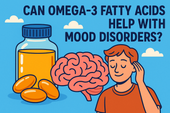
Can Omega-3 Fatty Acids Help with Mood Disorders?
Omega-3 fatty acids do more than support heart health — they can help balance mood, reduce depression, and calm anxiety. Discover how EPA and DHA nourish your brain, fight inflammation, and support emotional well-being from within. 🌊🧠
-

Vitamin D and Mood: The Sunshine Vitamin for Emotional Balance
Could the key to emotional balance be as simple as a little sunlight? Discover how vitamin D — the sunshine vitamin — influences serotonin, reduces inflammation, and helps you feel more positive and resilient year-round. ☀️💛
-

The Role of Magnesium in Reducing Irritability and Low Mood
Feeling on edge or emotionally drained? Magnesium could be the missing link between your body and your mood. Discover how this essential mineral reduces irritability, balances neurotransmitters, and helps your nervous system find calm again. 🌿✨
-
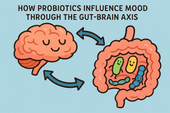
How Probiotics Influence Mood Through the Gut-Brain Axis
Discover how probiotics can do more than support your digestion—they can actually uplift your mood. This article explores the fascinating gut-brain axis and how balancing your gut bacteria through probiotics may help reduce anxiety, improve emotional stability, and support long-term mental well-being. 🌿🧠
-
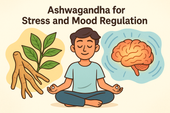
Ashwagandha for Stress and Mood Regulation
Discover how Ashwagandha, the powerful adaptogenic herb 🌿, helps your body manage stress and regulate mood. Learn how it balances cortisol, boosts GABA and serotonin, and supports emotional stability — helping you feel calm, focused, and resilient every day.
-
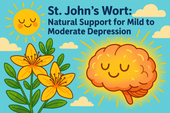
St. John’s Wort: Natural Support for Mild to Moderate Depression
Discover how St. John’s Wort, the “sunshine herb” 🌼, naturally supports mild to moderate depression. Learn how it boosts serotonin, balances mood, and promotes emotional resilience — with research showing its effectiveness compares to antidepressants, but with fewer side effects.
-
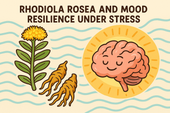
Rhodiola Rosea and Mood Resilience Under Stress
Discover how Rhodiola rosea helps your body adapt to stress 🌿. Learn how this powerful adaptogen balances cortisol, supports serotonin and dopamine, and strengthens emotional resilience — helping you stay calm, focused, and energized under pressure.
-
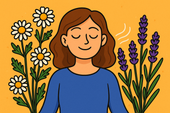
Chamomile and Lavender: Herbal Calm for Emotional Fluctuations
Discover how chamomile and lavender bring calm to emotional ups and downs 🌿. Learn how these two soothing herbs balance your nervous system, ease anxiety, and support restful sleep — naturally helping you find peace and emotional stability.
-
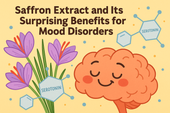
Saffron Extract and Its Surprising Benefits for Mood Disorders
Discover how saffron extract — the golden spice of joy 🌸 — can naturally support mood balance, ease anxiety, and lift mild depression. Learn what science says about its serotonin-boosting power, the ideal dosage, and how this ancient remedy compares to modern antidepressants.
-
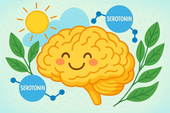
5-HTP and Serotonin: A Natural Path to Lifting Mood
Discover how 5-HTP naturally boosts serotonin 🌞 — the neurotransmitter behind mood, sleep, and emotional balance. Learn how this plant-derived compound supports happiness, reduces anxiety, and improves rest by helping your brain create more serotonin the gentle, natural way.
-
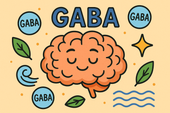
GABA Supplements for Reducing Anxiety and Mood Swings
Discover how GABA supplements can help reduce anxiety and balance mood naturally 🌿. Learn how this calming neurotransmitter works to quiet the mind, ease stress, and improve sleep — plus which nutrients and habits can boost your body’s own GABA production for long-term emotional stability.
-
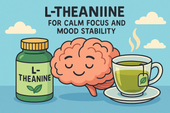
L-Theanine for Calm Focus and Mood Stability
Discover how L-theanine, the calming compound found in green tea 🍵, promotes focus, relaxation, and mood stability. Learn the science behind how it balances neurotransmitters, reduces stress hormones, and enhances clarity — helping you stay centered, calm, and productive without sedation.
-
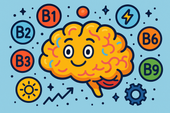
B Vitamins and Brain Chemistry: Supporting Energy and Emotional Balance
Discover how B vitamins power your brain chemistry ⚡. Learn how B6, B9, and B12 support serotonin, dopamine, and energy production — helping boost focus, mood, and emotional balance. From diet to supplements, explore how this vital nutrient group keeps your mind resilient and your energy steady.
-

N-Acetyl Cysteine (NAC) and Mood Disorders: What the Research Says
Learn how N-Acetyl Cysteine (NAC) supports brain health and mood balance 🧠. Discover how this antioxidant helps reduce oxidative stress, regulate glutamate, and improve emotional stability in depression, bipolar disorder, and anxiety — backed by cutting-edge psychiatric research.
-

Supplements for Bipolar Disorder: What May Support Stability
Discover the best supplements for bipolar disorder 🌿 that may support emotional stability and brain health. Learn how nutrients like omega-3s, magnesium, vitamin D, and NAC can help reduce inflammation, balance neurotransmitters, and complement traditional treatment safely.

















































